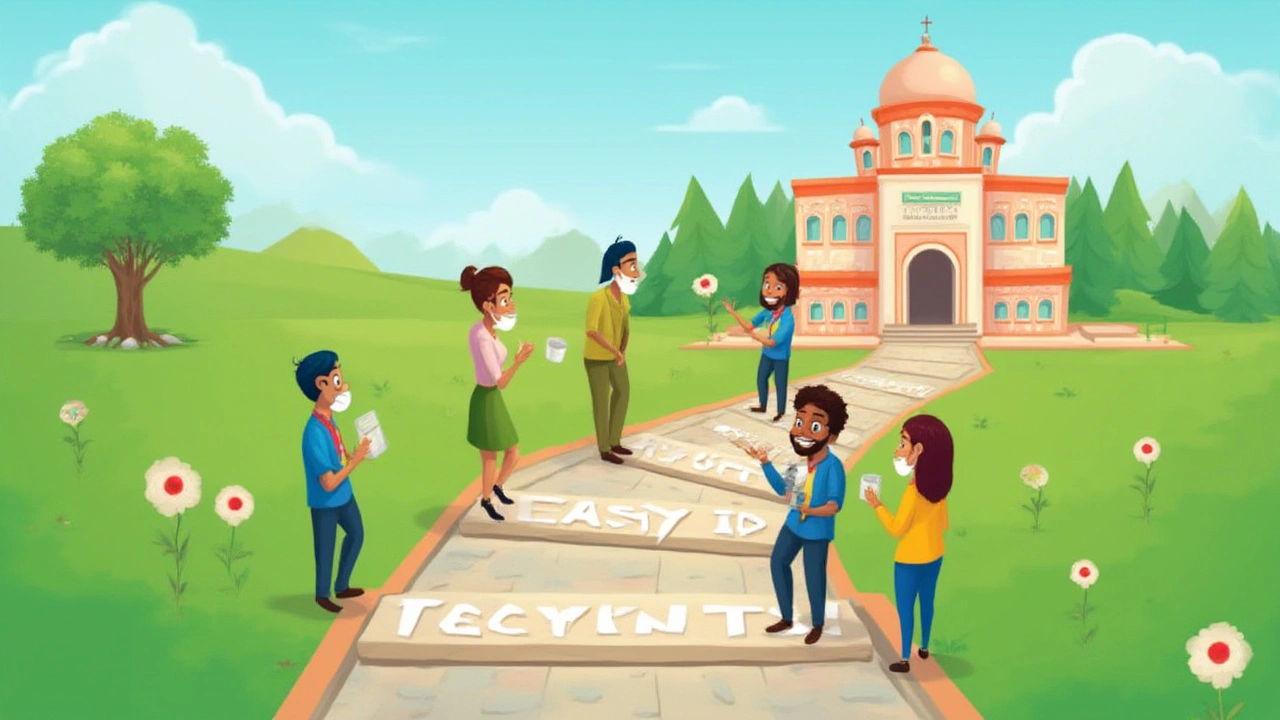Everyone wants a simple government job that pays well, offers solid perks, and doesn’t leave you watching the clock crawl. But here’s the twist: “easy” means different things to different people. Some want low stress, others want a fast hiring process, and a few just need a job that won’t drag them through a maze of exams and interviews. If you’ve ever daydreamed about a steady paycheck from Uncle Sam without running the gauntlet, you’re definitely not alone. Millions try their luck every year, with public-sector jobs getting over 80 million applicants across India, the US, and the UK in 2024 alone. But what are the best bets?
Fact vs. Fiction: What Makes a Government Job Truly "Easy"?
Let’s cut through the myth first. Most folks think every government job needs years of study and nerves of steel. That’s not true. There’s a big range, from bureaucratic big shots, right down to entry-level roles with only basic qualifications. In 2025, the number one thing making jobs “easy” to get is the competition-to-vacancy ratio. Seriously, this stat changes everything. Consider postal jobs: in the US, postal worker roles regularly get filled with just a high school diploma, basic English, and a background check. The exam? Multiple choice and mostly common sense questions. In India, clerical jobs (like SSC CHSL and state-level LDC) are snapped up by folks with 12th-grade education and speed typing skills. Over 70% of applicants for these jobs say the real hurdle isn’t the difficulty of the exam but simply staying alert during the process.
There’s also the myth that only technical or administrative jobs pay well and stay easy. Wrong again. Railway ticket collector, customs officers, police constable, and municipal office clerk – these roles don’t require a PhD, but they fill critical government needs, so agencies are always hiring. In Canada and Australia, entry roles in immigration support and customs are in hot demand, often requiring just a diploma, a short online test, and maybe a medical fitness check. In fact, according to Australia’s Public Service Commission, over 30% of new federal hires in 2024 held “certificate” or “associate” level credentials only.
The real kicker: most of these jobs promise steady hours, predictable shifts, and automatic pay bumps. A postal worker in New York with 3 years’ seniority earns about $55,000/year, with free healthcare and pensions on top. An Indian railway ticket examiner in Mumbai clears the equivalent of $7,000 plus overtime—way above the national median. If you’re wondering about work-life balance, check the stats: according to the U.S. Office of Personnel Management, 90% of new civil service hires either maintain standard 9-5 hours or get their pick of alternative shifts.
Check out this table comparing key easy-entry roles in different countries for real-world perspective:
| Country | Job Title | Education Req. | Avg. Salary (USD) | Recruitment Steps |
|---|---|---|---|---|
| USA | Postal Worker | High School Diploma | $55,000 | Test, Background Check |
| India | Lower Div. Clerk | 12th Grade | $7,000 | Test, Typing, Doc Check |
| Australia | Customs Officer (Entry) | Diploma | $47,000 | Test, Fit Check |
| UK | Administrative Assistant | GCSEs | $31,000 | Application, Interview |
Don’t overlook jobs in public schools or libraries either. Teacher’s assistant jobs, lab helpers, and municipal librarians can pop up with little more than local certification or basic training, and they score high for job satisfaction. The key is to match your qualifications and priorities – do you want a desk job, fieldwork, or people-facing work? Each has sweet spots where competition is reasonable and the jump from application to appointment can take just 2-3 months.

The Hidden Gems: Real Jobs, Real Perks, Minimal Hassle
If you know where to look, the public sector is full of low-drama jobs practically made for folks who want a career, not a calling. Here’s the secret—smaller cities and rural areas are always short on applicants, so snagging a role is way easier than in metro centers. In 2025, over 40% of government job openings in the U.S. came from counties with fewer than 50,000 people. These gigs still pay standard rates and come with the same federal benefits.
Let’s break down the types of jobs most people overlook, which are actually pretty easy to grab:
- Clerical positions: Office assistant, data entry operator, municipal clerk. Usually just require a basic computer test, document check, and a short interview. Typing speeds matter more than degrees here.
- Support services: Drivers, junior lab attendants, library assistants, and dispatchers. Pay is on par with other entry-level gigs, but work is generally routine and low-pressure.
- Public utility jobs: Meter readers, linemen assistants, water board helpers. Little customer interaction, good shift flexibility, and, in some cases, no written exam at all—just a trade test or demo.
- Healthcare support: Hospital attenders, sanitation workers, orderlies in city hospitals. Not glamorous, but these jobs have the lowest entry bar, steady pay, and significant overtime allowances.
- Security: Watchman, public building security, and junior constable roles. Many let you apply without prior experience, and you learn everything with paid training.
What’s striking is these roles—often filled by folks with average grades and simple resumes—tend to have much lower applicant-to-position ratios than the well-known jobs. For example, a Delhi government peon opening in 2024 had just 150 applicants per seat, compared to nearly 10,000 applying for one clerical seat in central government offices.
Now, if you want to boost your odds, here’s a pro tip: certifications help, but so does networking. Get to know local officials or people who’ve just landed these jobs. They’ll have insider updates on when positions may open up, and sometimes those jobs aren’t even listed online—think school noticeboards, bulletin boards at city halls, and local newspapers. Government HR is notorious for slow web updates, so being early makes you a star applicant.
Let’s tackle the paperwork dilemma. Many easy entry jobs skip the essay writing, multi-stage group discussions, or years-long waiting lists. For instance, the US Census Bureau’s field enumerator jobs open every ten years and mainly need you to pass a short background check and possess a clean driving record. During census seasons, the department fills 700,000+ field roles in a two-month blitz, and the average hire takes less than 10 days from applying to orientation. If speed matters to you, keep an eye out for these mass hiring blitzes.
Entry-level doesn’t mean dead-end either. Indian clerks can climb to supervisor or section officer with time served—no new exam needed, just seniority. The same’s true for US city maintenance crews or Canadian postal workers. Promotion paths exist if you show up, do your job, and don’t rock the boat.

How to Crack the Application Code: Winning Tips for Quick Government Entry
Nabbing easy government jobs isn’t just luck—it’s about working the system. First up: get your paperwork ready before announcements drop. Government hires are plagued by slow deadlines, but late applicants are almost always tossed. Have PDFs of your transcripts, proof of address, and an up-to-date passport-size photo handy.
Next, skip the scattergun approach. Instead of cramming for the big national tests with a million rivals, hunt for niche postings at city, county, or district levels. The number of applicants is smaller, and the tests (if any) are lighter—think basic math, grammar, or computer skills. In Canada, city council jobs often require a personality test but no technical knowledge. In the UK, you may just face a short situational judgment test and an interview—no essay writing or panel grilling.
If you’re worried about passing on the first try, don’t sweat it. Most easy-entry tests are repeated every year or, in some departments, every few months. Past years’ question papers are often posted on official websites. Mock tests and YouTube walkthroughs will give you a feel for the format and boost your speed. In fact, a 2024 survey from India’s Staff Selection Commission found over 60% of clerical hires cracked the test on their second or third attempt—practice, not genius, is the decisive edge.
Don’t miss deadlines and always double-check your documents. About 12% of applications in 2024 were rejected simply because of missing or mismatched paperwork (wrong birth date, no local address proof, or unsigned forms). Double-check everything before you hit submit, and if an interview or skill test is coming, practice for the everyday stuff: typing, simple arithmetic, or speaking calmly when answering questions.
For folks without a formal degree, look for contractual or seasonal roles with local, state, or federal agencies. Short-term contracts often convert to permanent seats after a year or two if you show up and don’t cause trouble. The social security office, tax department, utility boards, and public works all hire this way.
Another clutch move: apply for multiple jobs at once—but target only those with matching requirements. In Australia, for instance, public sector openings allow you to reuse your online resume for dozens of roles in the same agency. The shortcut? Make a killer base application, then fine-tune it for each post. Don’t copy-paste aimlessly, though; use the right job title and keywords to sneak through the HR filtering bots.
Watch for roles that become “hard” only because of myths. Eg, many think public hospital jobs require a medical degree. For support gigs (attender, records technician, cleaner), all you typically need is physical fitness and the ability to read instructions. Check for disability and minority quotas, too. In India and several US states, reserved categories fill up even if you score lower in the test, so don’t skip checkbox questions if you’re eligible.
The final word: patience and consistency beat raw talent. Easy government jobs aren’t always glamorous, but they pay the bills, build solid careers, and are much less stressful than trying to fight it out in the private sector rat race. Stay sharp, keep your ears open, and you might be updating your status as a government employee sooner than you expect.
